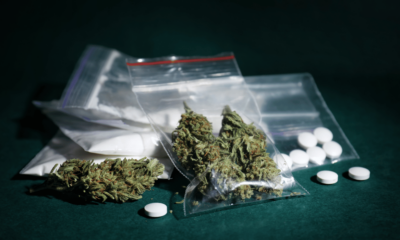A review examined if CBD could be helpful in reducing the symptoms of opioid withdrawal including pain and anxiety.
Researchers examined 41 studies to see if CBD may help to reduce withdrawal symptoms from opioids.
Opioid abuse has been described as a national crisis in the US. There were almost 50,000 deaths from opioid-involved overdoses in 2019. This included heroin, synthetic opioids and prescription pain killers. It is estimated that between 8 and 12 per cent of people using opioids for chronic pain go on to develop an opioid use disorder.
The review highlighted that there is a ‘critical need’ to find cost-effective treatment alternatives. The US Centers for Disease Control and Prevention estimates that the total cost of opioid misuse is approximately US$78.5 billion per year. This relates to healthcare, lost productivity, treatment and criminal justice costs.

Withdrawal from opioids can be debilitating including symptoms such as anxiety, pain, gastrointestinal issues and insomnia. It can be divided into different types: acute withdrawal refers to a cluster of symptoms and only lasts one to two weeks, then protracted withdrawal symptoms which can persist for months after. There is also a risk of failure resulting in relapse, overdose or death.
Opioids and CBD
The review found that CBD may be an antidepressant, anti-inflammatory, anti-emetic, analgetic and anxiolytic which may help with different symptoms. It also noted that it may help to reduce craving for opioids with no significant adverse effects.
Researchers wrote: “Growing evidence suggests that CBD could potentially be added to the standard opioid detoxification regimen to mitigate acute or protracted opioid withdrawal-related symptoms. However, most existing findings are either based on preclinical studies or small clinical trials. Well-designed, prospective, randomised-controlled studies evaluating the effect of CBD on managing opioid withdrawal symptoms are warranted.”
Opioids and anxiety
Protracted withdrawal symptoms can lead to the development of mental health issues such as anxiety and depression. Although it can also be an early symptom starting in the first twenty-four hours after a person stops taking opioids.
Substance use can cause overstimulation of dopamine which gives a euphoric feeling. Dopamine is a neurotransmitter associated with how we feel pleasure. It can be made naturally in the brain although some people may have lower levels than others due to certain conditions such as ADHD. The brain can lose the ability to produce dopamine on its own. The brain becomes dependent on the substance for more pleasure. When withdrawal happens, a person may become anxious or experience irritability.
CBD may help to reduce anxiety by interacting with the CB1 and CB2 receptors in the body. These are found in the peripheral nervous system and central nervous system. Studies on CBD and anxiety show that it may interact with the 5-HT1A neuro-receptor that is linked to anxiety, depression and happiness.
Opioid reduction
Some chronic pain patients in various US states have had success in switching their prescription painkillers for CBD or medical cannabis.
One study from Florida on 157 registered medical cannabis patients revealed that 65 per cent of patients had been able to reduce their consumption of medications over time. A further 18 per cent of patients reported they had been able to discontinue opioids, 18 per cent stopped using anxiolytics and 15 per cent stopped their anti-depressant use. Patients also reported being able to swap their NSAIDS and sleep aids.


 News6 months ago
News6 months ago
 News6 months ago
News6 months ago
 Science5 months ago
Science5 months ago
 Industry6 months ago
Industry6 months ago
 News6 months ago
News6 months ago
 News5 months ago
News5 months ago
 Health4 months ago
Health4 months ago
 News5 months ago
News5 months ago














